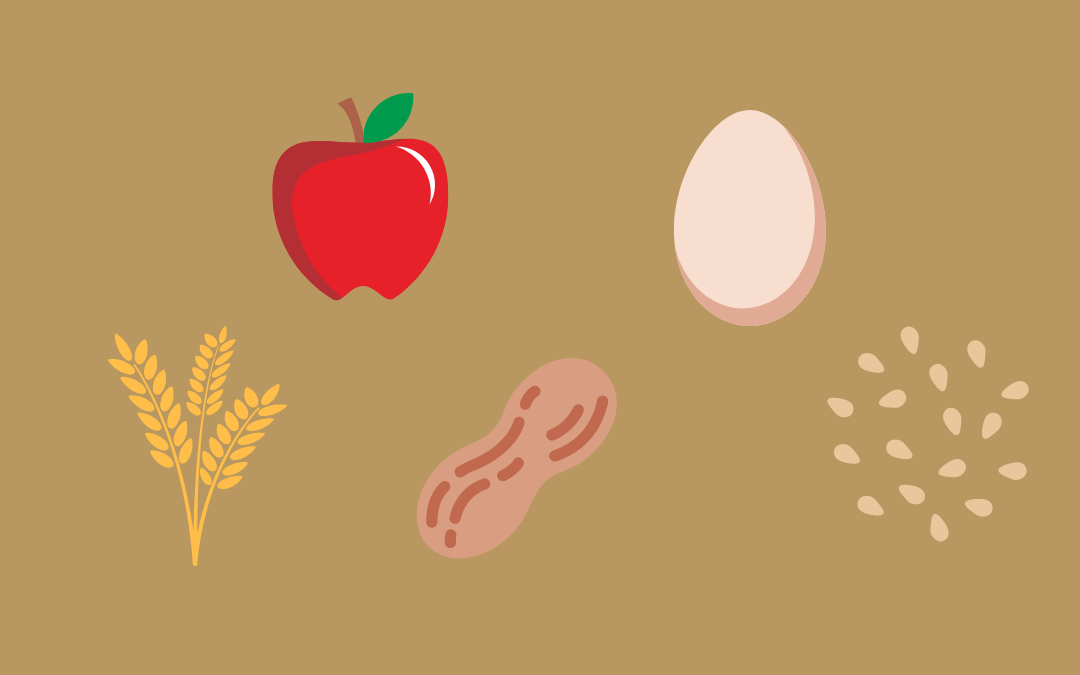Your baby’s health is of the utmost importance so knowing the foods they could be allergic to is very useful. We are going to go through the most common allergies in this blog to make sure you as a parent are prepped and ready.
What is an allergy?
Just a quick bit of medical information.
An allergy and intolerance are not the same things, and it is important to distinguish between the two.
What’s an intolerance?
An intolerance to a type of food is an inability to digest the foodstuff in question such as a gluten or lactose intolerance. These are not caused by the immune system so do not cause the same reaction as an allergy. Common symptoms of an intolerance are…
- Non-life-threatening stomach issues or pain
- Bloating
- Gas
- Nausea
- Heartburn
- Headaches and migraines
All of which are uncomfortable but should work their way out.
What’s an allergy?
An allergy is an adverse reaction to something that is usually harmless such as pet hair, certain medications and pollen. Symptoms of an allergic reaction include…
- Sneezing or runny nose
- Pain or tenderness around the eyes, cheeks or forehead
- Itchy skin or rash (hives)
- Swelling of the face, eyes and throat
- Coughing, breathlessness or wheezing
- Feeling or being sick
Among others.
An allergic reaction can be dangerous if it is severe enough.
There are also 4 types of allergic reactions as described by the Advanced ENT & Allergy Center: Anaphylactic, cytotoxic, immunocomplex and cell-mediated. The most common of which is anaphylactic.
Both intolerances and allergies can be minor to severe and if you are in any way concerned always consult a doctor.
What are the common allergies in babies?
These are common allergies found in babies and children.
Milk
Unlike lactose intolerance, babies can have an allergic reaction to the protein in cow’s milk. Many children grow out of this type of allergy but it can stay into childhood and adulthood.
Eggs
About 2% of children have an allergy to eggs.
Peanuts
One of the most common allergies, and yes it is separate from other nut varieties as it is a legume. This allergy is often lifelong.
Tree Nuts
Things like Brazil nuts, hazelnuts, pecans and cashews (among others) are all in the tree nut family.
Soy
Another common food allergy, soy comes from soybeans which is a legume (like peanuts) – some people can be allergic to just one type of legume while others are allergic to multiple.
Sesame
Usually a lifelong allergy. Can only take a small amount of the foodstuff to trigger a reaction.
What are the potential intolerances in babies?
Gluten
Gluten is found in a lot of cereals, things like bread and pasta and various other foodstuffs. You can start to introduce your baby to gluten-containing food as soon as they start to ween. Start with small amounts and build up. By checking how they react you can figure out if they have an intolerance or not. It is also good to note that gluten intolerance is not the same thing as coeliac disease, which is an autoimmune disease.
Fructose
When an individual cannot create the enzyme that digests fructose, this is a fructose intolerance. It is a rare disease but, something worth being aware of and can be quite serious. The symptoms will become clear as soon as the baby starts on formula or begins to eat food. Symptoms can range from excessive sleepiness and poor appetite to convulsions.
Lactose
Same as in adults it is the inability to digest milk-based products that contain lactose. This is because individuals lack the enzyme lactase. A baby often doesn’t produce enough in infancy to digest the lactose and can be intolerant, causing an upset stomach.
BabyInsight
Cells4Life understand how important your baby’s health is. That is why we created BabyInsight – a postnatal genetic screening that allows you to check the likelihood of your baby having 5 different genetic conditions
- AAT deficiency – Alpha-1 antitrypsin deficiency – raises your chances of developing lung and other diseases.
- Gluten sensitivity – checking early to avoid gluten-heavy foods in case your baby is intolerant or has coeliac disease.
- Lactose intolerance – checking early to avoid lactose-heavy foods.
- Drug-induced deafness – Certain drugs that cause deafness are toxic to the inner ear – this is called Drug Ototoxicity and it is dependent on the dose.
- Hereditary fructose intolerance – a lack of the enzyme Aldolase B – if fructose or sucrose is consumed it can cause severe hypoglycaemia.
The BabyInsight test will check the potential of your baby having one of these manageable conditions and sensitivities so you can quickly put measures in place. If you are interested in this or any of our other services, get in touch and get your FREE parent guide.
Request a Welcome Pack
Find out more about cord blood banking by downloading a Welcome Pack now.









